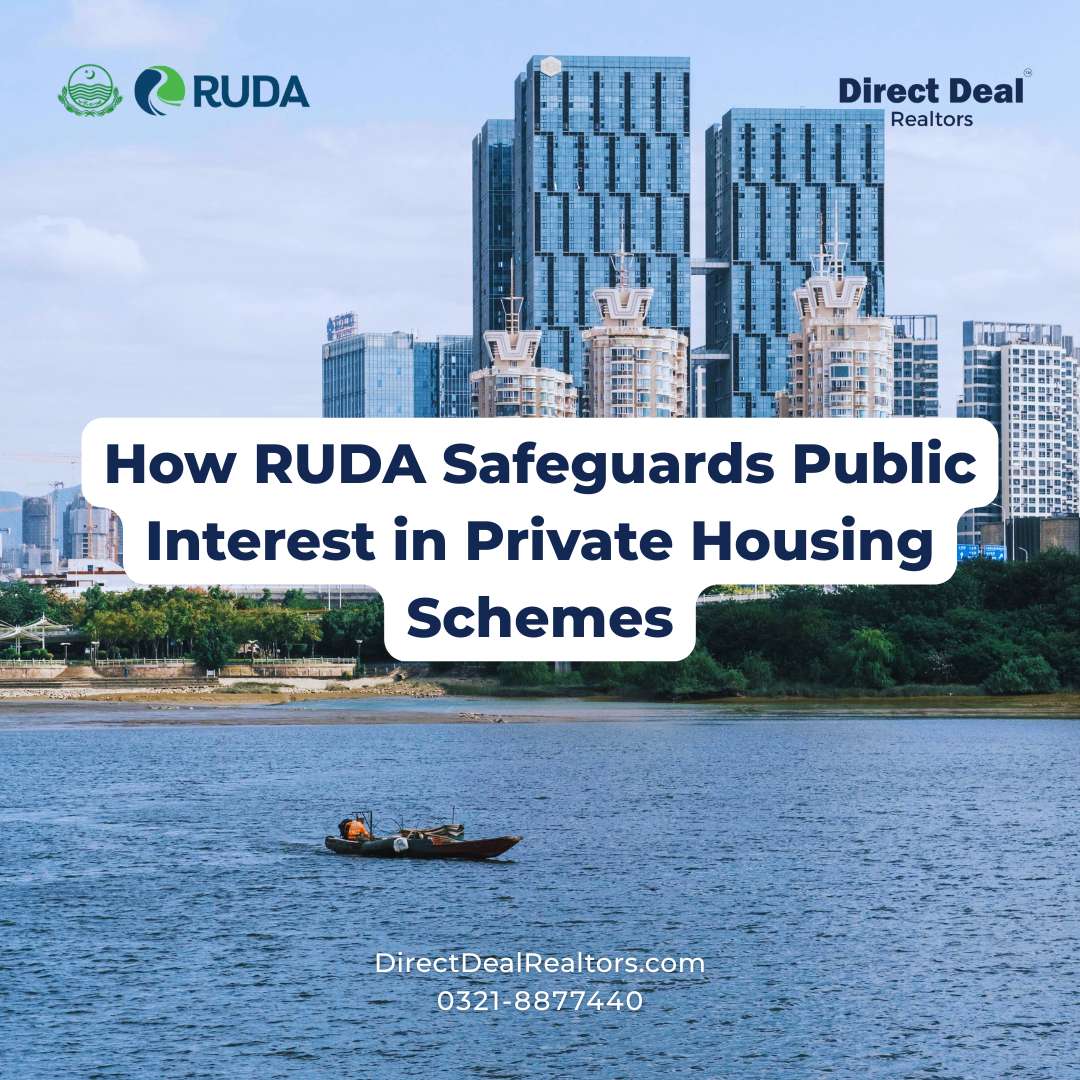How RUDA Safeguards Public Interest in Private Housing Schemes
By: Deal
How RUDA Safeguards Public Interest in Private Housing Schemes
The Ravi Urban Development Authority (RUDA) plays a pivotal role in balancing urban growth with public welfare in Lahore. While private housing societies drive real estate development, RUDA’s regulations ensure that developers prioritize transparency, legal compliance, and accountability. This article explores how RUDA protects the interests of the general public through its approval process, overselling, and unethical practices.
Also Read: RUDA’s Approval Process for Private Housing Societies
1. Preventing Overselling: The Mortgage & Transfer System
RUDA’s regulations mandate strict financial and legal commitments from developers to prevent overselling and ensure project completion:
- 20% Mortgage of Plots:
Developers must mortgage 20% of total plots to RUDA as collateral. These plots are released only when infrastructure milestones (e.g., roads, water supply) are met. This ensures developers cannot sell these plots prematurely, reducing overselling risks.- Impact: Buyers are protected—if the developer defaults, RUDA uses mortgaged plots to fund completion of project.
- Transfer of Public Land:
Developers must transfer 50% of public amenity sites (parks, roads, graveyards) to RUDA. This prevents developers from illegally converting public spaces into sellable plots.
2. Validating Land Ownership & Documents
RUDA’s approval process includes rigorous verification to ensure developers legally own the land and provide authentic documents:
- Proof of Ownership:
- Only registered sale deeds, fard malikan (ownership records), or mutations are accepted.
- General Power of Attorney (GPA) or unregistered agreements are rejected.
- Public Notice for Objections:
- Before approval, RUDA publishes a Form A notice in newspapers, inviting public objections.
- Disputed land is excluded from the scheme, ensuring only legitimately owned plots are developed.
- Khasra Plan Verification:
- The developer’s layout plan must match the khasra boundaries. RUDA cross checks with satellite imagery to detect land-grabbing or fake claims.
Also Read: RUDA Releases List of Illegal Housing Societies
3. Ensuring Financial Accountability
RUDA ties financial safeguards to project milestones to protect buyers’ investments:
- Trunk Public Infrastructure Development (TPID) Charges:
- Developers pay upfront fees for essential infrastructure (roads, sewage, water supply).
- 25% paid during PPP, with the rest secured via bank guarantees. This ensures funds are allocated for public utilities.
- Bank Guarantee:
- Developers submit a bank guarantee equal to 100% of development costs during final approval.
- If the project stalls, RUDA encashes the guarantee to complete the work.
4. Transparency in Marketing & Sales
RUDA’s regulations curb misleading advertisements and unethical sales tactics:
- Advertisement Rules:
- All ads must include sanction details, mortgaged plots, and infrastructure timelines.
- False claims (e.g., “GUARANTEED RETURNS”) are prohibited.
- Registered Sale Agreements:
- Developers must execute legally binding agreements with buyers, specifying possession dates, penalties for delays, and refund policies.
- Ban on Pre-Launch Sales:
- Developers cannot sell plots before obtaining Final Sanction. This prevents “paper projects” or “File System” that exist only in brochures.
5. Environmental & Social Safeguards
RUDA ensures projects align with sustainable development goals:
- Environmental NOC:
- Developers must obtain clearance from the Provincial Environmental Protection Agency to address water, waste, and ecological concerns.
- Mandatory Public Amenities:
- 7% open spaces, 2% graveyard, and 5–10% public buildings (schools, clinics) must be allocated.
- These amenities are transferred to RUDA, ensuring they remain accessible to residents.
6. Penalties for Non-Compliance
RUDA imposes strict penalties to deter fraud and delays:
- Fines: Up to Rs. 20,000/day for illegal development.
- Imprisonment: Up to 3 years for severe violations.
- Project Cancellation: If developers fail to meet deadlines or oversell, RUDA cancels approvals and blacklists the developer.
RUDA Security Paper:
Each plot’s sale would require a RUDA security paper, ensuring developers cannot sell plots without valid, traceable approvals.
Conclusion: RUDA as a Guardian of Public Interest
RUDA’s regulations transform Lahore’s real estate sector from a “wild west” of unplanned development into a structured, planned accountable ecosystem. By mandating financial safeguards, validating land ownership, and prioritizing public amenities, RUDA ensures that private housing schemes benefit both investors and communities. For the public, understanding these safeguards are key to making informed, secure investments in RUDA approved projects.
Disclaimer:
The information provided in this article is based on publicly available sources and RUDA’s regulations as of October 2023. Regulatory frameworks, approval processes, and policies are subject to change as Ravi Urban Development Authority (RUDA) updates its guidelines. Readers are strongly advised to:
- Consult RUDA Officials: Visit RUDA’s office or contact their helpline for clarifications on specific projects or requirements.
- Review Official Documents: Always refer to RUDA’s latest notifications and approved layout plans on their official website.
- Verify Security Papers: Confirm the authenticity of allotment letters or deeds through RUDA’s QR verification system.
- Seek Legal Advice: Engage a certified real estate lawyer to review agreements, titles, and approvals.
This article is for informational purposes only and does not substitute professional legal or regulatory guidance. Neither the author nor the publisher assumes responsibility for decisions made based on this content. Always prioritize direct communication with RUDA for updated and project-specific details.
The author and publisher of this article do not assume responsibility for any decisions, financial losses, or legal disputes arising from the use of this content. RUDA’s rules, regulations, bidding processes, and eligibility criteria are subject to change, and readers must conduct their own due diligence.
Stay Informed. Stay Protected.